Home Tags Posts tagged with "london 2012"
london 2012
Triple jumper Phillips Idowu, former gymnast Nadia Comaneci and ex-basketball star John Amaechi will carry the flame on day 64 of the torch relay between Greenwich and Waltham Forest.
Nadia Comaneci and John Amaechi will meet on the roof of the North Greenwich Arena.
Pop star Dizzee Rascal and footballer Fabrice Muamba, who suffered a cardiac arrest during an FA Cup match in March, will also carry the flame.
Saturday’s 36-mile relay is the first full day in London.
Highlights will include visits to the Cutty Sark and the 2012 Games Equestrian Arena in Greenwich.
The day will begin at Greenwich Park at 07:22 BST and the first of 143 torches will be lit outside the Royal Greenwich Observatory.
It will be carried by 15-year-old Natasha Sinha, who was her nominated for her dedication to swimming and cross country running, and she will take the flame through Greenwich Park into the Games equestrian arena.
There it will be passed to another 15-year-old, Ella Statham, who was chosen for her volunteer work with the London Football Association.
Ella’s route will take her past Queen’s House and the Old Royal Naval College.
At about 07:43 BST the flame will be carried on a lap around the restored Cutty Sark ship, which was one of the last tea clippers to be built and was one of the fastest of its kind.

Triple jumper Phillips Idowu, former gymnast Nadia Comaneci and ex-basketball star John Amaechi will carry the flame on day 64 of the torch relay
The torchbearer at the Cutty Sark will be Sir Robin Knox-Johnson, who was the first person to sail solo non-stop around the world.
He also founded the Clipper Round the World Yacht Race in 1995 and has been a Cutty Sark Trustee since 2011.
Two hours later the relay will arrive at the Woolwich Live Site where Jaco Van Gass, a soldier with the First Parachute Regiment, will carry the flame.
The 25-year-old was hit by a rocket-propelled grenade while serving in Afghanistan, resulting in the loss of his left arm, a collapsed lung, punctured internal organs, loss of muscle and tissue from the upper left thigh, multiple shrapnel wounds and a fractured knee, fibula and tibia.
In 2011, Jaco Van Gass was one of four injured servicemen in the Walking With The Wounded team who set a world record by walking to the North Pole.
At about 09:52 BST legendary gymnast Nadia Comaneci – winner of five Olympic gold medals and the first gymnast to score a perfect 10 – will meet ex-basketball star John Amaechi on the roof of the North Greenwich Arena, where they will exchange the flame.
The arena is the venue for the London 2012 gymnastics events and basketball finals.
In Newham, British javelin legend Tessa Sanderson-White will carry the flame. She won gold at the 1984 Games in Los Angeles and is the only British woman to have done so in an Olympic throwing event.
Saturday’s relay will also include stints from London’s youngest and oldest torchbearers.
Chester Chambers, 12, was nominated for representing his classmates on the Thomas Tallis School Council, fundraising and helping to develop an anti-bullying. He will carry the flame in Greenwich.
At the other end of the age spectrum, centenarian Fauja Singh will carry his torch in Newham. The 101-year-old started his career as a marathon runner at the age of 89 and has now completed nine marathons.
His personal best time of 5 hours and 40 minutes was set at the 2003 Toronto Waterfront Marathon and is a world record for the over-90s. This year he completed the London Marathon in 7 hours and 49 minutes.
At about 14:20 BST Tahmina Begum will carry the flame at Stepney Green Park. The 19-year-old was the first qualified Bangladeshi female football referee and has been officiating local league football matches in east London since 2010.
Visits to Clissold Park, Hackney Town Hall and Leyton Cricket Ground will follow before Muamba carries the flame as the last torchbearer of the day.
The 24-year-old was playing for Bolton against Tottenham on 17 March when he had a cardiac arrest and collapsed on the pitch. It was later revealed that his heart stopped beating for more than an hour.
He was discharged from hospital on 16 April, having been fitted with an implantable cardioverter-defibrillator, and has not ruled out the possibility of playing professional football again.
An evening celebration, featuring entertainment from Rizzle Kicks and Twist and Pulse, will be held at Chestnuts Field in Waltham Forest.
The flame will be carried by a total of 8,000 people during its 8,000 mile, 70-day journey to the opening ceremony of the Olympic Games in London on 27 July.
Thousands of UK border staff (Home Office) will strike the day before London Olympics open, the Public and Commercial Services (PCS) union has said.
PCS members will strike for 24 hours next Thursday – when many thousands of visitors are due to arrive in the UK.
Home Secretary Theresa May said the action was “shameful” as it threatens disruption to people travelling to London for the Games.
Immigration minister Damian Green said contingency plans were in place.
East Midlands Trains staff has also voted to strike during the Olympics.
PCS union members will take other forms of action from July 27 to August 20, including working-to-rule and an overtime ban.
The PCS said 57.2% of those who voted backed strike action – the turnout was 20%.
The action will involve staff across the Home Office, including the UK Border Agency, the Identity and Passport Service and Criminal Records Bureau.
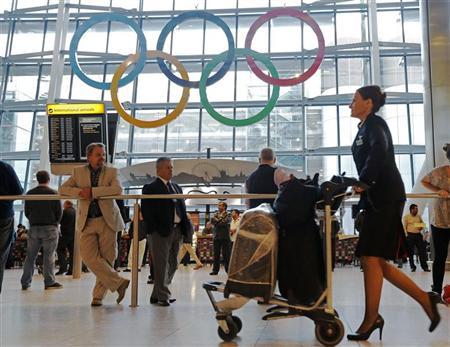
Thousands of UK border staff will strike the day before London Olympics open
PCS general secretary Mark Serwotka said: “I think the government is whipping up hysteria about the Olympics, there’ll be no disruption to the Olympics, this is a 24-hour strike before the Olympics actually takes place.”
He said he was prepared to meet the culture secretary and home secretary any time in the next week to avert a strike but if they kept their “heads in the sand” the strike would continue.
London Mayor Boris Johnson has said he does not think the union will succeed in disrupting the Olympics and the majority of PCS members want to put on a great Games.
In other developments as the UK prepares for the start of the Olympics on Friday 27 July:
• An additional 1,200 troops have been put on standby to provide security at Olympic sites following G4S’s problems deploying enough staff
• The Duchess of Cambridge has met the London 2012 Olympic torch relay’s oldest bearer at the opening of a new exhibition in London
• Olympic medallist Steve Backley and artist Tracey Emin are among those carrying the Olympic torch as it travels from Deal to Maidstone, in Kent
• Great Britain’s women’s basketball team are beaten 88-63 by USA despite a spirited performance in a Games preparation match in Manchester
• Drivers on East Midlands Trains will strike from 6-8 August, union Aslef says, threatening disruption to spectators travelling to the Games
• Certain ministers, including the prime minister, chancellor, culture secretary and foreign secretary will be allowed to use the priority car lanes
Immigration minister Damian Green said: “If this strike goes ahead it will be a selfish and irresponsible act by the union leadership, they have got no authority for this, only about a fifth of the membership voted in the ballot, and of that small minority only just over half want to go on strike.”
Damian Green said he was confident disruption at immigration desks could be minimized because extra staff from the Home Office and other departments had been trained to provide cover.
Theresa May condemned the action saying: “I think that is shameful, frankly. They are holding a strike on what is one of the key days for people coming in for the Olympic Games.
“We will of course put contingency arrangements in place to ensure we can deal with people coming through the border as smoothly as possible.”
John Cridland, director general of the Confederation of British Industries, said: “For PCS to go on strike on this key day beggars belief. For it to happen because of a vote by 11% of staff is simply outrageous.”
But Labour MP John McDonnell, who chairs the PCS Parliamentary Group, said: “The government has brought this dispute on its own head.”
East Midlands Trains drivers from the union Aslef plan to strike on 6-8 August in a row over pensions. But South West Trains staff has voted not to strike over the Olympics.
Prime Minister David Cameron insisted the Olympics would be safe and secure.
Speaking at a press conference in Afghanistan, he said: “I do not believe it will be right, I do not believe it will be justified.”
Labour leader Ed Miliband also condemned the strike.
The PCS is in dispute with the Home Office on plans to cut 8,500 jobs and the threat of compulsory redundancies in the passport office in Newport, South Wales.
There are also disagreements over pay rises capped at 1% following a two-year wage freeze, privatization of services, and alleged victimization of union reps.
This week the National Audit Office said the UK Border Agency had laid off 1,000 more staff than intended and was having to hire extra people and increase overtime to meet its workload.
The PCS is one of the largest unions in the UK with around 250,000 public sector members.
PCS members at the Department for Transport have been taking industrial action over the past few weeks, while staff in other departments, including the ministries of defence and justice, are set to vote shortly on how to campaign against cuts.
Thousands of Olympic athletes and officials are to begin arriving in London, as questions remain about recruitment of security staff.
Preparations for London 2012 are intensifying with the opening ceremony just 11 days away.
The first priority “Games Lane” has begun operation on the M4 and the Olympic drug testing lab starts work.
Meanwhile, the chairman of G4S has refused to express support for his chief executive over the guards fiasco.
Heathrow Airport is standing by to process as many as 120,000 passengers on Monday, about 10,000 more than would be normal for this time of year.
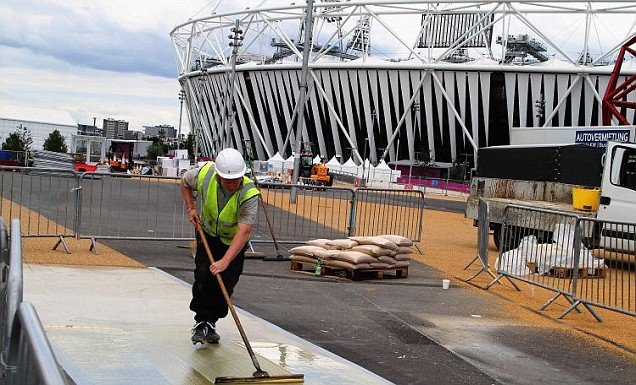
Preparations for London 2012 are intensifying with the opening ceremony just 11 days away
Immigration Minister Damian Green has said that the UK Border Force would be in full “Olympic mode” as of Sunday and he promised all immigration desks at Heathrow would be manned at peak times.
Volunteers will be directing athletes to the coaches and trains that will take many of them to the Olympic Village in Stratford, east London.
The village will house 16,000 athletes and officials at its peak.
Those that travel by road will benefit from the first of the Games Lanes which at busy times will operate between Junction 3 and Junction 2 of the M4 motorway towards London.
The motorway has just reopened following emergency repairs on a damaged flyover near Junction 2.
The rest of the 30 miles of dedicated lanes in the Olympic Route Network (ORN) will be operational by the middle of next week, with heavy fines for those who misuse them.
All road users will be able to go into the lanes when they are not in use overnight.
Sports Minister Hugh Robertson said the authorities had plans to lift the restrictions if they were causing gridlock.
Kevin Delaney, from the Institute of Advanced Motorists, said the lanes could exacerbate traffic problems in the capital.
“If anything goes wrong with the central and inner London transport network, we tend to get a wholly disproportionate amount of congestion – and so the Games lanes themselves will actually impose serious constraints on this already stretched network,” he said.
The biggest anti-doping operation in the history of the Olympics also begins on Monday.
Drug testers are expecting to take the first of about 6,000 samples for testing at the London 2012 laboratory.
Half of the competitors will be tested including every medallist at the Olympics and Paralympics.
Ahead of the Games G4S chief executive Nick Buckles has been criticized over the private security firm’s failure to recruit enough security guards for the Olympics, after it emerged last Wednesday that 3,500 troops were being drafted in to plug gaps in staff provision.
G4S chairman John Connolly told the Financial Times: “We don’t want to do anything that smacks of short-term expediency, but it would be right to consider whether any members of the senior team are best placed to take the company forward.”
This comes after Nick Buckles told the Sunday Telegraph he plans to stay to help deliver the contract but that he had considered quitting over the issue.
Nick Buckles is due to appear before the Home Affairs Select Committee on Tuesday to answers MPs’ questions after he apologized on Saturday and said then that he only began to know things were going wrong “eight or nine days ago”.
The Commons Public Accounts Committee has summoned G4S, two government departments and Games organizer LOCOG to appear before it in September.
London 2012 chairman Lord Coe said security for the Olympics had not been compromised by the failure of G4S to recruit enough security staff.
G4S said it stood to lose up to £50 million ($80 million) on the contract, worth a total of about £280 million ($445 million), after being unable to provide the 10,000 staff it had been contracted to deliver.
The Kazakh Olympic team is hoping to boost its chances of sporting success at London 2012 with horsemeat sausages.
Sports officials in Kazakhstan say that the traditional dish may help the athletes’ performance.
But it is unclear whether the sausages will be allowed into the UK, because of strict import controls on meat.
Kazakhstan is fielding 114 athletes at the London games, which begin in two weeks.
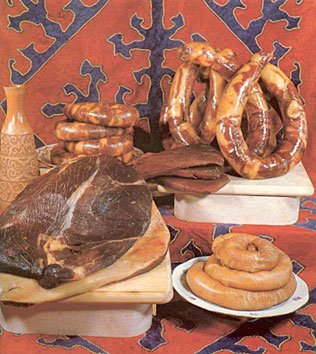
The Kazakh Olympic team is hoping to boost its chances of sporting success at London 2012 with horsemeat sausages
Horsemeat is an indispensable part of the traditional Kazakh diet, and a dried horsemeat sausage known as “kazy” is particularly cherished.
The Kazakh team is made up mainly of boxers, wrestlers and weightlifters, all sports associated with a protein-rich diet.
“We’ll bring horse meat and caviar for each team,” sports official Elsiyar Kanagatov said, adding that athletes could achieve “outstanding results” if fed properly.
Oil-rich Kazakhstan is fiercely ambitious and there is also the promise of hard cash should athletes succeed – $200,000 for a gold medal, $150,000 for silver and $75,000 for bronze, our correspondent says.
The team has won 39 medals including nine gold since its debut at the Olympics in 1996.
International Olympic Committee (IOC) has announced that Saudi Arabia will send two female athletes to compete in the London 2012 Games.
Sarah Attar will compete in the 800 m and Wodjan Ali Seraj Abdulrahim Shahrkhani in the judo competition.
The Saudi authorities lifted a ban on women from the Gulf kingdom competing in the Games last month.
The public participation of women in sport is still fiercely opposed by many Saudi religious conservatives.
IOC President Jacques Rogge said it was “very positive news” and “an encouraging evolution”.
“I am pleased to see that our continued dialogue has come to fruition,” he said in a statement.
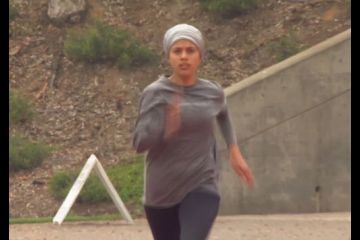
Sarah Attar from Saudi Arabia will compete in the 800 m at London Olympics
The IOC, keen to ensure “gender balance” at the Games, had been speaking to the Saudi Arabian Olympic Committee about the issue.
Speaking from her training base in the US, Sarah Attar said: “It’s such a huge honour and I hope that it can really make some big strides for women over there to get more involved in sport.”
The inclusion of the Saudi women means that, for the first time in the history of the Games, there will be a female entrant from every competing nation.
Female athletes from Qatar and Brunei are also due to attend for the first time.
Brunei’s Maziah Mahusin will complete in the athletics, while Qatar has entered athletes into the swimming (Nada Arkaji), athletics (Noor al-Malki), table tennis (Aya Magdy) and shooting (Bahiya al-Hamad).
Bahiya al-Hamad is also set to carry the Qatari flag at the opening ceremony, in what she said was a “truly historic moment”.
New York-based Human Rights Watch said the inclusion of Saudi women was a step forward.
“It’s an important precedent that will create space for women to get rights, and it will be hard for Saudi hardliners to roll back,” the organization’s Minky Worden said.
There is almost no public tradition of women participating in sport in Saudi Arabia, and officials have found it difficult to find athletes who could meet the minimum criteria for competing.
Officials have also said that female competitors will need to dress in such a way as “to preserve their dignity”.
This is likely to mean loose-fitting garments and a scarf covering the hair but not the face.
Armed forces in UK are on standby to provide an additional 3,500 troops to help with security at the 2012 London Olympics.
It comes amid fears that private contractor G4S would not be able to provide enough trained staff in time.
The armed forces were already providing some 13,500 personnel – this could now reach 17,000, meaning summer leave for some troops will likely be cancelled.
G4S said it had “some issues in relation to workforce supply”.
The company is being paid £300 million ($480 million) to guard the Games, but it has not been able to guarantee it can supply the 10,000 guards it has been contracted to deliver.
A G4S spokeswoman said the company had accepted “that the government has decided to overlay additional resources.”
She added: “This has been an unprecedented and very complex security recruitment, training and deployment exercise which has been carried out to a tight timescale.
“We have encountered some issues in relation to workforce supply and scheduling over the last couple of weeks, but are resolving these every day and remain committed to providing a security workforce for the start of the London 2012 Games.”

Armed forces in UK are on standby to provide an additional 3,500 troops to help with security at the 2012 London Olympics
The armed forces were already due to provide some 13,500 personnel to help at the Games, with more available as a contingency plan.
Whitehall sources are keen to stress that there is no impact on security at the Games.
Defence Secretary Philip Hammond will announce more details about the extra troops on Thursday, the Home Office said.
In a statement, it said: “We have agreed to offer help to G4S by revising the level of military support.”
It added the government and all involved were focused on delivering a “safe and secure Games”.
“Our approach is intelligence-led and risk-based, and we retain the ability to be flexible in our response.
“The government are committing £553 million for venue security and we remain confident that we will deliver within budget.”
Labour’s shadow Olympics minister, Tessa Jowell MP, said there was “clearly a serious problem”.
“With two weeks to go to the start of the Games, it is imperative that action is taken to ensure that the full and necessary quota of security personnel are in place so that the Games will be safe and secure,” she said.
“We need to know why the problem has emerged so late in the day and precisely what has been agreed to.
“We also must know whether this affects Army commitments elsewhere, which units are providing people and what terms and conditions are given for those who will likely lose periods of leave.”
She added that – in the spirit of the cross-party approach to the Games – it was “essential that the Opposition is kept fully informed of these events as they develop”.
G4S said its planning with organizing committee LOCOG and other security agencies allowed for “a variety of contingencies which have been reviewed in the build-up to the Games.”
A spokesman for the London mayor, Boris Johnson, said: “The mayor takes the issue of Olympics security extremely seriously, and having the finest and bravest service men and woman in the world at our disposal during the Games should be a source of great comfort.”
The government has previously said a total security force of 23,700 will take care of venue security, including the G4S contingent.
G4S will have overall control of Olympic venue security, working alongside unarmed troops, searching and checking people going into the stadiums and other venues.
Olympic sites number more than 30 sporting venues and more than 70 “non-competition venues” including car parks and hotels.
Dutch Olympic athletes are facing government fines because they delayed finishing their degrees.
About 50 of the athletes competing at the London 2012 Games are still at university or college.
For many of them, Olympic training commitments have interrupted their studies meaning they will be forced to pay thousands of euros in penalties.
Dutch law states that each student must pay standard tuition costs for the duration of their course.
Most courses last four years for most degrees, and slightly longer for subjects like medicine.
Among those facing fines is Wouter Brus, a 20-year-old member of the 4×100 m relay team, who is two years into a physiotherapy degree.
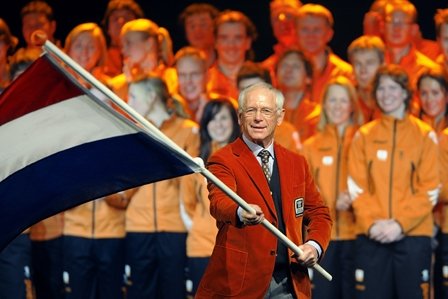
Dutch Olympic athletes are facing government fines because they delayed finishing their degrees
“It’s crazy. I don’t understand how they can say our country supports sport. Three thousand Euros [$3,741] is a lot of money. I don’t think it’s fair. I feel like I’m competing for my country but my country is not supporting me.”
On top of their allocated course of study, every student is given one additional year in which the normal tuition fees still apply.
If students exceed the deadlines, then they are charged.
“If I wanted to not get behind with my studies I would have to be in class every day. Sometimes we have training twice a day so it would be impossible. I have to choose between school and sport. I choose sport, so I get the fine.”
Freek Manche, a spokesman for the education ministry, says the government has already provided universities with the means to compensate students whose studies have been delayed by their Olympic training regimes.
“We provide institutions with 18 million Euros in <<profileringsfondsen>> [funds for making an institution stand out in chosen areas]. It’s up to them to compensate the Olympic students or choose to allocate the money elsewhere.”
But the majority of Dutch universities argue that the government should be providing extra cash to ensure that the potential of the country’s top sports stars is not hampered by the potential accumulation of massive debts caused by their sporting dedication.
Nienke Meijer, the vice-president at Fontys University of Applied Sciences, says: “We definitely think that a national government that pushes so hard on our Olympic ambitions should help athletes to finish their studies without fines.”
She believes the Dutch government is using the young athletes to boost the Netherlands’ bid for the 2028 Games but failing to support their academic responsibilities.
“Don’t only focus on the golden medals they can win today for our country, but also help them to finish their studies in the meantime so they also have a great future after their sporting careers.”
The extra funds provided by the government are limited. If that money is used to compensate the sports students then the universities argue that others will suffer.
And, in the short term, their fear is that the prospect of fines will affect athletes performance at London 2012.
But relay racer Wouter Brus says his mind is fully focused on the track and field.
“The Olympics are everything. I will not focus on a fine I will get in two years. I will focus on my execution and my team, they are the most important things right now.”
Danny Boyle, artistic director of the London 2012 Olympic opening ceremony, has apologized to volunteers over “spoilers” appearing in the press.
In an email sent to the 10,000 members of the public participating in the 27 July event, Danny Boyle asked them to “stay virtuous” and “protect the show”.
“Many of you have been dismayed by the media scrutiny on the show,” he wrote.
“I am sorry that, despite our best efforts, we appear to be unable to stop these stories appearing in the press.”
At a media briefing last month, the Oscar-winning director revealed the ceremony would feature a recreation of the “British countryside” featuring country scenes and farmyard animals.

Danny Boyle, artistic director of the London 2012 Olympic opening ceremony, has apologized to volunteers over "spoilers" appearing in the press
In the weeks that followed, several newspapers published follow-up stories revealing additional, unsanctioned information about the event.
“Some of you have asked why we agreed to the two media briefings we have done when <<open season>> continues on trying to reveal every aspect of our work to the public ahead of 27 July,” wrote Danny Boyle in his email.
“We thought they would be a good way to satisfy the media’s curiosity about our show but, in the case of certain papers, it hasn’t quenched their desire to be the first to reveal every detail possible.”
London 2012 organizing committee chairman Lord Coe made similar comments on Twitter at the weekend asking for details to be kept secret.
“Share the frustration of volunteer performers and the public at Opening Ceremony being unofficially trailed. Let’s #savethesurprise,” he said.
One billion people worldwide are expected to watch the opening ceremony, which will feature music by electronic duo Underworld and a “harmonically-tuned” bell weighing 23 tons.
Cast rehearsals continue at the Olympic stadium in east London, which has been fitted with a million-watt sound system.
Cast members have been asked to sign and abide by a non-disclosure agreement.
The International Olympic Committee (IOC) has begun an investigation into claims Olympics representatives were willing to sell thousands of tickets for the London Games on the black market.
The IOC’s ruling executive board met after fresh claims by the Sunday Times involving more than 50 countries.
This included allegations that tickets for top events were available for up to 10 times their face value.
The IOC has referred the allegations to its independent ethics commission.
The Sunday Times submitted a dossier of evidence detailing claims that Olympic officials and agents had been caught selling thousands of tickets on the black market for up to 10 times their face value.
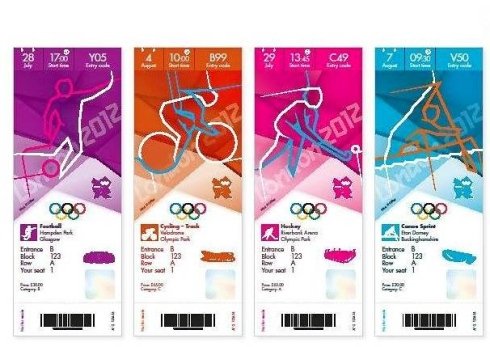
IOC has begun an investigation into claims Olympics representatives were willing to sell thousands of tickets for the London Games on the black market
The IOC could also review how Olympic tickets are distributed among member countries – more than one million were distributed to those taking part in the Games.
The Sunday Times alleges, during a two-month investigation in which reporters posed as Middle Eastern ticket touts, it found corruption involving people representing 54 separate countries.
More than one million London 2012 tickets were distributed abroad among all the nations taking part in the Games, but the IOC has strict rules to try to combat touts.
National Olympic committees must ensure that their allocation is only sold within their own region.
Last month a senior Ukrainian Olympic official resigned after being filmed by the BBC offering tickets for cash.
The IOC said in a statement: “The International Olympic Committee (IOC) has moved quickly to deal with allegations that some National Olympic Committees (NOC) and Authorized Ticket Resellers (ATR) have broken rules relating to the sale of Olympic tickets.
“The IOC takes these allegations very seriously and has immediately taken the first steps to investigate.
“Should any irregularities be proven, the organization will deal with those involved in an appropriate manner.
“The NOCs are autonomous organizations, but if any of the cases are confirmed the IOC will not hesitate to impose the strongest sanctions.
“The IOC has also determined that it will take on board any recommendations coming out of the inquiry to improve the way that tickets are allocated and sold internationally in the future.”
London 2012 organizing committee LOCOG said it would support the IOC in its investigation “in any way we can”.
“Rules and regulations for selling London 2012 tickets to international fans are clear and unambiguous,” it said.
No tickets intended for the British market were involved, it added.
Volodymyr Gerashchenko, a senior Ukrainian Olympic official, has been suspended after a BBC investigation showed he was willing to unofficially sell 2012 tickets for cash.
Volodymyr Gerashchenko, of Ukraine’s National Olympic Committee (NOC), told a reporter posing as a UK tout he would have up to 100 tickets to sell.
It is a criminal offence, punishable by fines of up to £20,000 ($32,000), to sell London 2012 tickets to touts.
Volodymyr Gerashchenko claimed he had “never planned to sell tickets in the UK”.
Ukrainian Olympic chief Sergei Bubka said he called Volodymyr Gerashchenko in Kiev on Tuesday to tell him he was suspended pending an investigation.
Strict rules, applying to countries outside the European Union, say tickets can only be sold to those who are resident within that country to stop tickets entering the black market.
BBC London has previously uncovered how some official ticket resellers were flouting the London Olympic Games and Paralympic Games Act, designed to stop Olympic tickets entering the black market.
After receiving information that someone from Ukraine’s national Olympic committee might be prepared to sell tickets, a BBC reporter posing as an unauthorized ticket dealer from the UK spoke to Volodymyr Gerashchenko who confirmed he would be prepared to sell tickets.
Volodymyr Gerashchenko, who has been general secretary of his national Olympic committee since 1997, told an undercover reporter: “I understand you’re a dealer – that’s why for me, you are priority number one, the top, the person, in case we have extra tickets to contact you, we contact you.”

Volodymyr Gerashchenko, of Ukraine's National Olympic Committee (NOC), told a reporter posing as a UK tout he would have up to 100 tickets to sell
During a subsequent meeting at a hotel near the Olympic Park in east London, Volodymyr Gerashchenko explained he was in the process of distributing tickets to Ukrainian fans, coaches and officials.
However, once this process had finished, he would be prepared to sell up to 100 spare tickets.
Asked by the undercover journalist if payment could be made by bank transfer he replied: “I think it is when it comes, better cash. Possible?
“Better cash and finished with it. I hope to arrive 10 July.”
When asked by the BBC why he was prepared to break Olympic rules and UK law in offering his country’s Olympic tickets on the black market, Volodymyr Gerashchenko claimed he had “never planned to sell tickets in the UK” and had been making “diplomatic talk to satisfy the persistent interest of the ticket dealer”.
Volodymyr Gerashchenko said: “We have more demand than the number of tickets so we will use all tickets allocated to the NOC of Ukraine. We will need more tickets and we will try to find them on the LOCOG Exchange page.”
He said that the meeting with the undercover reporter “was unofficial, with no intention to make any real deal”, either in writing or verbally.
Adding: “All points that [the reporter] mentioned were not [the] subject of any deal. I have nothing to propose. I did not have real tickets to sell.
“I agreed to do this meeting only for the reason not to offend the person from the host-country who asked me several times for a meeting.”
Former Olympic Minister Tessa Jowell MP has now called for an investigation.
“I think it’s shocking, here’s somebody who’s exploiting the system and if the charge against them is proven, the sanctions are very heavy,” she said.
A spokesperson for the International Olympic Committee (IOC) said: “We take these allegations very seriously indeed. If proven we will not hesitate to impose tough sanctions.”
Jeremy Summers, an expert in sports law who provided legal counsel at the Sydney 2000 Olympic Games, said the latest revelations were particularly embarrassing for the IOC.
“The IOC tried to sharpen its act for itself and the various other Olympic committees, following the scandals of the late 1990s (namely, allegations of bribery to win the right to host the 2002 Winter Olympics in Salt Lake City).
“We’ve given a higher allocation of tickets to the NOCs than we’ve ever done before. It looks like it stinks. It’s something you shouldn’t be seeing happening.”
Olympic organizers, LOCOG and officers from the Metropolitan Police’s dedicated Operation Podium team have vowed to clamp down on unauthorized ticket reselling, which is expected to soar after the last remaining tickets go on sale to the public this week.
A London 2012 spokesperson said: “We take these allegations extremely seriously. We have asked the BBC for full access to the evidence and we will investigate straight away.
“If these allegations are true, we are prepared to take tough and immediate action.”
A Metropolitan Police spokesperson said: “We have made contact with BBC London as we would like to see all of the material which they have so that we can carry out a full assessment of it.”
Scotland Yard added: “The safest way for the public to purchase tickets for the Olympic and Paralympic Games is from the London 2012 website.
“If you buy from an unofficial site or from a tout, you risk paying over the odds for a ticket that may not exist, may not be genuine and you risk not getting to see the Games. Your personal details could even be used in other crimes.”
Ukraine secured 27 medals at the Beijing games, ranking the country at number 11 in the world in terms of medal achievement.
The already “extreme” risk of a flu pandemic spreading in the UK will increase during the Olympics, a report has said.
Britain has been ranked by analysts Maplecroft as second only to Singapore for the speed at which influenza could spread, because of its dense cities and status as a global travel hub.
The report said the “large influx of visitors” at Olympic Games time would raise the “already significant” risk of spread.
But the Health Protection Agency (HPA) disagreed, saying the risk was low.
“We have done our own review and we don’t believe that there is a risk,” said Dr. Brian McCloskey from the HPA.
“We have sporting events and music festivals all around England and we had the swine flu pandemic at Glastonbury. We also looked at research from the Vancouver Games – neither produced any significant problems.”
Dr. Brian McCloskey said that at Glastonbury in 2009, hundreds of thousands of people were densely packed in fields together for days at a time during the outbreak of influenza strain H1N1.
Whereas he said at London 2012 visitors would only be at the Olympic Park for four or five hours, so the risk was reduced.
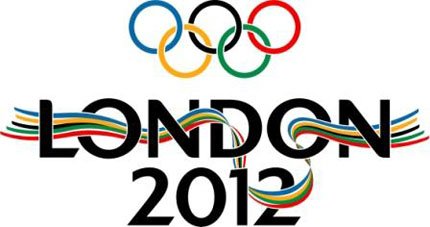
Maplecroft report said the "large influx of visitors" at Olympic Games time would raise the "already significant" risk of flu spread in UK
Maplecroft’s influenza pandemic risk index rates five countries at the “extreme” level of risk for the pandemic spread of the disease, with Singapore top, followed by the UK, South Korea, the Netherlands and Germany.
The study said that the Olympics would increase the danger of flu spreading because of the extra 5.3 million overseas tourists expected to visit Britain for the Games.
But it also found that Britain was in the top 10 of countries best placed to withstand any outbreak.
The Department of Health (DoH) said that the NHS had contingency plans in place for any eventuality.
“Outbreaks of infectious diseases during the Games have been very rare,” a spokesperson said.
“The Health Protection Agency (HPA) responds to over 5,000 disease outbreaks each year and has robust systems and processes in place to do this.
“There is a comprehensive testing and exercising plan in place to make sure that all systems are ready.”
Dr. Brian McCloskey said the chance of flu spreading during sporting events was quite low.
“It is much the same as it would be in any summer,” he said.
“The fact lots of people are going to London during the Games, doesn’t really change it.
“We have to be very careful about new diseases coming in but that doesn’t mean we are high risk. Conditions won’t be as such during the summer to make flu spread easily.”
He added that the HPA would not be recommending any specific health precautions, other than those it already gives.
“Our normal advice would be if you feel unwell then stay at home. Then there is the standard advice we give across London at all times about sneezing, coughing and washing your hands.
“The simple advice would be, don’t worry. But anyone feeling unwell – where they feel there is a cold, or have diarrhoea and vomiting then stay at home and don’t bring it out with you.
“It’s not an area people should worry about in any sense.”
In January a series of reports, in The Lancet Infectious Disease journal, highlighted the risks of mass gatherings, such as London 2012.
Health experts said they can be a hotbed of diseases from across the world – the theory being that so many people, packed closely together, increases the risk of diseases spreading.
 Prev12Page 2 of 2
Prev12Page 2 of 2











